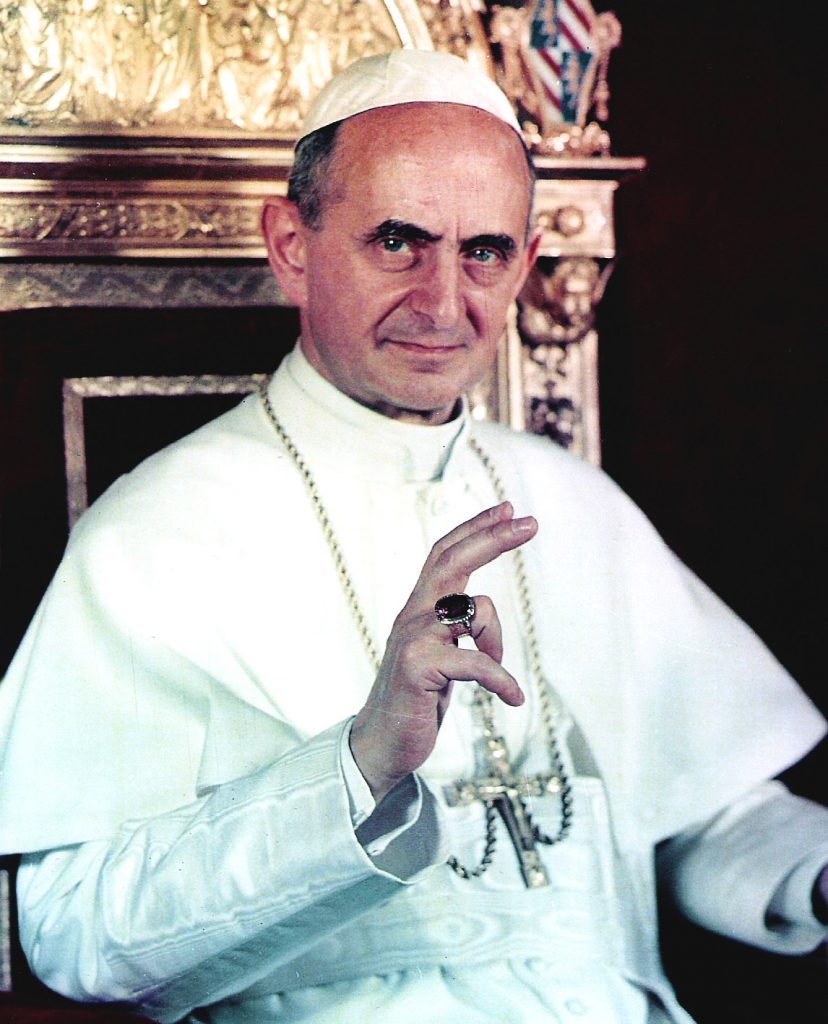Pope Paul VI shocked both the Church and the media in 1968 with his release of Humanae Vitae, an encyclical focused on the use of contraception within marriage.1 Pope Paul VI was not the first to look into the issue of contraception, with Popes Pius XI and Pius XII beginning to address the issue when Anglicans, followed by other Protestant denominations, abandoned the traditional stance of opposing forms of contraception. In the early days of the birth control pill, in 1963, Pope John XXIII formed a Pontifical Commission to look further into contraception. Paul VI was influential on the topic, and he continued the commission with the understanding that there were to be no early media leaks of the report.2

When the commission reported their claims, they were split into two parties: a majority of the commission was in favor of a more lenient stance, while a minority of the commission was in favor of the current Church teaching. The Majority report came back in favor of allowing contraception, citing reasons such as the teaching had changed but there had not been a reiteration of that teaching. The Church was comprised of married couples who approved or had used contraceptives, and the teaching had changed in thought, but not on paper. This was meant to say that despite the official changing of the teaching in document, the teaching had already changed, because, the Church is comprised of mostly married couples. The Minority report came back and said that:
“one can find no period of history, no document of the church, no theological school, scarcely one Catholic theologian, who ever denied that contraception was always seriously evil. The teaching of the Church in this matter was absolutely constant. Until the present century, this teaching was peacefully possessed by all other Christians, whether Orthodox or Anglican or Protestant.”3
The Minority report went onto say that, “the Church cannot substantially err in teaching doctrine, which is most serious in its import for faith and morals, throughout all centuries or even one century, if it has been constantly and forcefully proposed as necessarily to be followed in order to obtain eternal salvation.”4 In this statement, the Minority report made clear that if the Church was mistaken in the past about the morality of contraceptives, then all other moral teachings of the Church could come under questioned.5 The commission was ended in 1966, after a leak by the Majority report. The leak let out that they claimed that contraceptives were not evil in their nature, while the minority stated that contraception was morally wrong.6 Pope Paul VI found himself in a tough position because he wanted to avoid a leak, as media attention would affect the commission’s ability to perform its task. He decided to reject the Majority report and favor the more traditional view of the Minority report.7

Pope Paul VI‘s acceptance of the Minority report proved to be influential in the drafting and eventual release of Humanae Vitae. According to The Record, a Western Australian Catholic newspaper, the encyclical had already been drafted in 1967, before the Synod of Bishops.8 Pope Paul VI had asked the Synod of Bishops to send him their reflections on the topic. This was a surprise to the Bishops. Later, Monsignor Gilfredo Marengo, author of books about Humanae Vitae, said in an interview to the Catholic News Service that, “The news about the desire of the Pope to consult all the members of the synodal assembly is very important, because one of the accusations repeated most often after the publication of Humanae Vitae was that the pope decided to act alone, in a manner that was not collegial.”9 Out of the 199 Bishops present, only 25 responses were received, and only seven of those asked, including Bishop Fulton Sheen, then Archbishop of Rochester, New York, and Cardinal Karol Wojtyla, later Pope Saint John Paul II, reiterated the Church’s teaching. Whereas other responses asked for more openness to contraception in certain circumstances. Individuals who asked for a more lenient teaching included the Cardinals of Baltimore and Philadelphia, the Archbishop of Detroit, and the Bishop of Pittsburgh. Despite the mixed results from Bishops, Pope Paul VI decided to continue with the Church’s teaching on contraception.10 The Record also reported that Pope Paul VI decided to delay the release of the encyclical, and revisit the document. Those who supported revisiting the encyclical in early 1968 include Bishop Carlo Colombo, Pope Paul VI’s personal theologian, and Cardinal Franjo Seper, the Prefect of the Congregation for the Doctrine of the Faith. A final revision included the deletion of a section in which Pope Paul VI took upon himself responsibility for the encyclical.11 Cardinal Karol Wojtyla exerted additional influence, including providing materials for Pope Paul VI in the months that led up to the release of Humane Vitae. And a Polish theologian, who worked with Cardinal Wojtyla, stated to the National Catholic Reporter that, “about 60 percent of our draft is contained in the encyclical.”12
Pope Paul VI enacted Humanae Vitae on July 25, 1968, and it was officially released on July 29, 1968 by Monsignor Lambruschini. Evidence of last minute revisions were surfaced in Australia, which had received advanced copies of the encyclical, and would have been printed in mid-June because of mail time. Though the changes would have been minor, as a result, the media had not noticed them, and only focused on the rejection of the Majority report. In Humanae Vitae, Pope Paul VI first discussed how this teaching was grounded in natural law and divine Revelation. Later on, the notion of responsible parenthood and conjugal love was described in detail.13 Conjugal love, “human, total, faithful and exclusive, and fruitful,” describes the self-giving of married couples.14 This means that marriage, the procreative act, and offspring are directly related, and any obstacle to this is intrinsically evil because it is not a total giving of self and is not intended to be fruitful and bear offspring. This love is meant to be, “just as God’s love overflows into His creation of new beings, so too does the love of spouses extend beyond themselves into the creation of new life.”15

In the aftermath of the Humanae Vitae, there was an immediate objection to the teaching by members of both the media and theologians in the Church. A main question by theologians in opposition of the encyclical was the balance between Church teaching and personal conscience. This objection was brought up to say that married couples, with well-formed conscience, should be able to make their own decisions when it comes to married life. Despite this, much opposition to Humanae Vitae were varied, with French bishops stating that, “‘contraception can never be a good. It is always a disorder, but this disorder is not always culpable.”16 A large group of theologians in Washington DC protested the encyclical even before most bishops had received Humanae Vitae, and as a result of their protest, those bishops needed papal intervention through the “Statement of Theological and Pastoral Principles.” In this, the Church’s stance on conscience was restated. In Australia, however, the Australian Catholic Bishops’ Conference affirmed that Humanae Vitae is a papal authoritative teaching that every member of the Church must accept, a reaction that differed from most responses that questioned the authority of the teaching and stated that it is up to the conscience of married individuals to decide whether or not to use contraceptives.17
Despite receiving objections from its release in 1968, and its continuing to receive objections to our current time, the teachings of Humanae Vitae have been upheld and reaffirmed through the release of additional papal encyclicals, particularly, through Pope Saint John Paul II. Two of his works, Evangelium Vitae, the “Gospel of Life,” and Theology of the Body, a lecture series, are famous for renouncing the culture of death that the modern secular world supports, and for calling for a culture of life. In Theology of the Body, he describes how in mankind’s fallen state, a union of male and female is necessary to understand original unity. As part of this, John Paul II calls for couples to avoid the materialism of the world that uses contraceptives to inhibit fertility, and instead to use natural methods, such as natural family planning, to limit family size. The Church has reiterated the message that the procreative act is inherently good; however, when it is outside of marriage or has barriers such as contraceptives, it is wrong because it does not allow for the total gift of self associated with the procreative act.18
- I would like to thank Dr. James Greenaway for his assistance in the researching phase of this article. ↵
- Karl A. Schultz, “The Triumph & Tragedy of the Most Misunderstood Document in Modern Church History,” New Oxford Review 85, no. 6 (July/August 2018): 20-21. ↵
- Janet E. Smith, Humanae Vitae, a Generation Later (Catholic University of America Press, 1991), 15. ↵
- Janet E. Smith, Humanae Vitae, a Generation Later (Catholic University of America Press, 1991), 17. ↵
- Janet E. Smith, Humanae Vitae, a Generation Later (Catholic University of America Press, 1991), 17. ↵
- Cindy Wooden, “Birth of an Encyclical: Priest Documents Preparation of Humanae Vitae,” National Catholic Reporter, July 27, 2018. ↵
- Joseph Parkinson, “‘Humanae Vitae’ I: Pope Paul VI in Pastoral Mode,” Australasian Catholic Record 90, no. (April 2013): 186. ↵
- Joseph Parkinson, “‘Humanae Vitae’ I: Pope Paul VI in Pastoral Mode,” Australasian Catholic Record 90, no. (April 2013): 186-187. ↵
- Cindy Wooden, “Birth of an encyclical: Priest Documents Preparation of Humanae Vitae,” National Catholic Reporter, July 27, 2018. ↵
- Cindy Wooden, “Birth of an Encyclical: Priest Documents Preparation of Humanae Vitae,” National Catholic Reporter, July 27, 2018. ↵
- Joseph Parkinson, “‘Humanae Vitae’ I: Pope Paul VI in Pastoral Mode,” Australasian Catholic Record 90, no. (April 2013): 186-187. ↵
- Tad Szule, “Pope John Paul Helped Write ‘Humanae Vitae,'” National Catholic Reporter, April 14, 1995. ↵
- Joseph Parkinson, “‘Humanae Vitae’ I: Pope Paul VI in Pastoral Mode,” Australasian Catholic Record 90, no. (April 2013): 187-188. ↵
- Janet E. Smith, Humanae Vitae, a Generation Later (Catholic University of America Press, 1991), 108. ↵
- Janet E. Smith, Humanae Vitae, a Generation Later (Catholic University of America Press, 1991), 108-109. ↵
- Joseph Parkinson, “‘Humanae Vitae’ II: Conscience, Contraception and Holy Communion,” Australasian Catholic Record 90, no. 3 (June 2013): 299. ↵
- Joseph Parkinson, “‘Humanae Vitae’ II: Conscience, Contraception and Holy Communion,” Australasian Catholic Record 90, no. 3 (June 2013): 300-302. ↵
- Janet E. Smith, Humanae Vitae, a Generation Later (Catholic University of America Press, 1991), 245-247, 265. ↵



37 comments
Alicia Guzman
Growing up Catholic I have always been taught that contraceptive is immoral on the basis that it prevents the conception of human life and that is a decision should not be made by humans but by the Creator Himself. What this article does is state the reasoning on why the Catholic Church made the decision to stick with ideology when other sects of Christianity were deciding to evolve. Overall, this is an interesting article that delves deeper into the Church’s reasoning, something that is not typically taught in school. Congratulations on your nomination!
Hali Garcia
This is a very interesting article! On the topic of contraceptives in the Church, you have done very good research and have very good arguments for both sides. To me this is a very tricky topic because I think it just depends on the couple. I do not think that it should pertain to everyone. Something else that I have seen is that it also just depends on the parish, there are some that thinks it depends on the couple. Great job and congratulations on your nomination.
Mariah Cavanaugh
Your article presented well researched theological arguments from within the Catholic church, but it did not seem to go beyond that. I am continually astounded by the archaic idea that any religious organization feels that they have a say in what a woman does with her body. The Catholic church released documents, reports and had multiple meetings regarding something that happens in the privacy of a marriage. That simply blows my mind.
Sarah Uhlig
As a Catholic, I am very familiar on how the traditional church views contraceptives and other social topics. I do not know if I agree with Catholics making the decision for everyone that contraceptives are bad and I believe that the author of the article goes well into detail about how there are two views for this argument. I also like the points that were made and how the research that you performed was well shown in the work.
Maya Mani
This article stands out for a multitude of reasons. One of which is because of how polarizing the topic is, it is undoubtedly controversial! However this was a very thorough discussion that explained the views for and against contraceptives quite nicely. Often times it is hard to separate your personal views from your catholic views, it can be super conflicting. This is not only the case with contraceptives, but also with abortions and various other things the Catholic church is against.
Rosario Moreno
I can only imagine how hard it would be to be taken seriously at this time by the church in regards to contraceptives. I am glad today things have at least been a lot more welcoming or at least from what I’ve heard. I think you did a great job explaining what happened and how things progressed. Personally, I believe whatever you do regarding that is up to the person not the church.
Nadia Carrasco
Unlike most people I didn’t have prior knowledge on this issue. But I do know that contraception within the Catholic church is a topic that goes against the traditional ideology of Catholicism. I liked how both sides were clearly presented and backed up. Although I believe that whatever the choice you want to make regarding having or not having kids it’s up to the couple and there should not be any objection from third parties. Overall this was a very educational yet interesting article.
Maria Martinez
A very well written article! I had heard of the different controversies within the catholic religion but I had no idea that there were actual ‘debates’ that took place in regards to these issues. The controversy surrounding contraceptives has been going on for ages, and it will probably take a long time for the church to come to a decision that the majority of its followers will like but the fact that the leaders of the church are listening to the voices of its people and at least trying to get together to make a change is awesome.
Cameron Lopez
Very nice article, very informative and full of detail. It showed both sides and explained them quite well. I personally believe that whatever the choice you want to make regarding having kids or not, its completely up to you. There shouldn’t be any public opinion or anyone’s opinion for that matter. They will not be the ones taking responsibility for that child, its the person themselves. So unless the public or whatever third party is going to take some responsibility for the child then their opinion does not matter and should not be taken into consideration.
Krystal Rodriguez
I found this article very interesting for its controversial topic being presented in a way that wasnt biased. In my personal opinion I think people should have the choice to do what they want with their body. Its so much better to use contraceptives as opposed to getting pregnant with a child that was unplanned. Many times people aren’t ready for a baby and can’t provide for them at the moment. By using contraceptives they can wait to have kids once they know they are truly prepared.